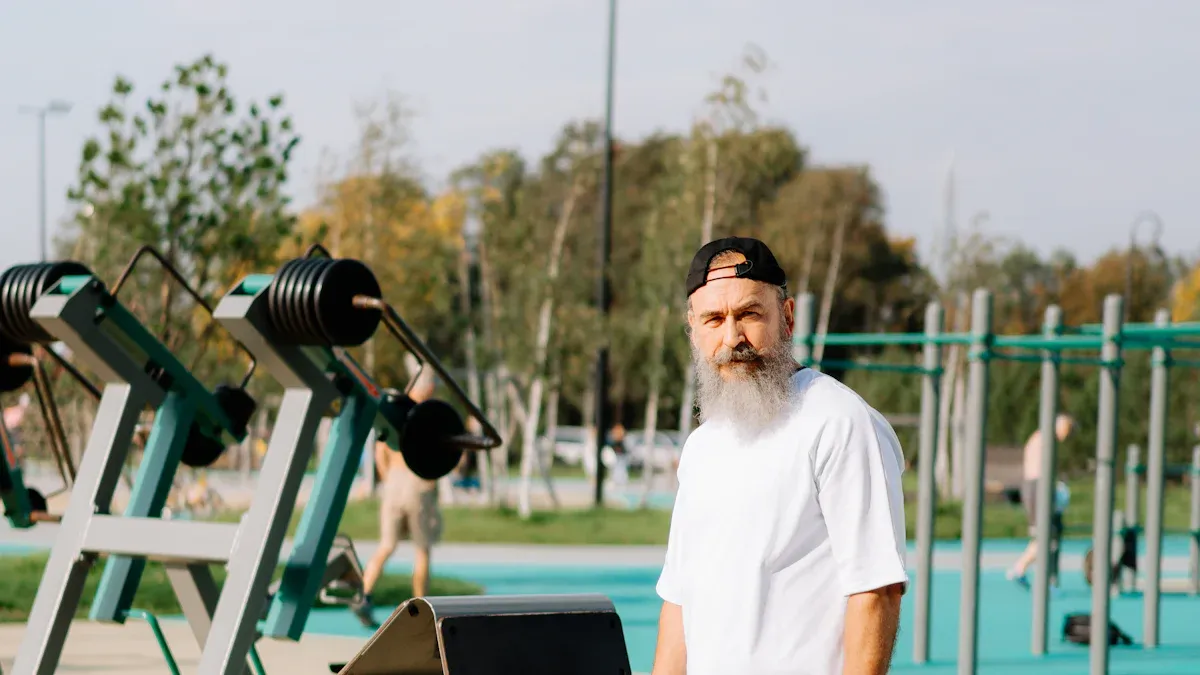O vercoming Fatigue with Simple Energy Boosting Tips

Feeling drained all the time? Cancer-related fatigue can make even simple tasks feel overwhelming. It’s not just about being tired—it’s a deep exhaustion that doesn’t go away with rest. Studies show that up to 25% of cancer survivors experience depression, which can worsen fatigue. But don’t worry, you’re not alone. In "Overcoming Fatigue: Energy Boosting Strategies for Survivors," you’ll find simple ways to regain your energy and take control of your day.
Key Takeaways
Cancer-related fatigue (CRF) is extreme tiredness that rest can't fix. Knowing this helps you understand your feelings and get help.
Eating healthy foods and drinking water can raise your energy. Try eating small meals often to avoid feeling drained.
Doing light exercise, like walking or yoga, can lower tiredness. Begin with little effort and slowly do more over time.
Understanding Cancer-Related Fatigue
What Is Cancer-Related Fatigue
Cancer-related fatigue (CRF) is more than just feeling tired. It’s a deep, persistent exhaustion that doesn’t go away, even after rest. Unlike normal fatigue, which might come from a busy day or lack of sleep, CRF can interfere with your daily life and make even small tasks feel overwhelming. It’s a common experience for cancer patients and survivors, with about 80% of those undergoing chemotherapy or radiation reporting fatigue. For many, this fatigue can last months or even years after treatment ends.
CRF is unique because it’s not tied to how much activity you’ve done. It’s often described as chronic, meaning it sticks around for a long time. Physical fatigue is the most common type, but emotional and cognitive fatigue can also play a role. This means you might feel physically drained, emotionally overwhelmed, or mentally foggy. Understanding this distinction can help you recognize that what you’re feeling is valid and not just “normal tiredness.”
Why Does It Happen
The exact causes of CRF aren’t fully understood, but researchers have identified several factors that contribute to it. Here’s a breakdown:
Factor Type | Description |
|---|---|
Mechanisms | The exact mechanisms of fatigue in cancer patients are largely unknown, with various potential causes. |
Immune Inflammatory Markers | Fatigue in breast and prostate cancer patients is linked to increased immune inflammatory activity. |
Cognitive Factors | Cognitive impairments, such as attention fatigue, are associated with cancer-related fatigue. |
Sleep Disorders | Disrupted sleep and inactivity are significant contributors to cancer-related fatigue. |
Psychological Factors | Anxiety and depression are common comorbidities that exacerbate fatigue in cancer patients. |
Additionally, treatments like chemotherapy and radiation therapy often trigger fatigue as a side effect. These treatments can cause inflammation in your body, which may lead to feelings of exhaustion. Emotional challenges, such as anxiety or depression, also play a big role. About 15% to 25% of cancer patients experience depression, which can make fatigue even worse. Recognizing these factors can help you take steps to manage your energy better.
Overcoming Fatigue: Energy Boosting Strategies for Survivors

Maintain a Balanced Diet
What you eat plays a huge role in how you feel. A balanced diet fuels your body and helps combat fatigue. Focus on meals rich in whole grains, lean proteins, fruits, and vegetables. These foods provide steady energy throughout the day. Avoid sugary snacks or processed foods—they might give you a quick boost but can leave you feeling more tired later.
Try eating smaller, more frequent meals instead of three large ones. This keeps your blood sugar stable and prevents energy crashes. Don’t forget to include foods high in omega-3 fatty acids, like salmon or walnuts, which support brain health and reduce inflammation.
Stay Hydrated
Dehydration can sneak up on you and drain your energy. Make it a habit to drink water regularly, even if you’re not thirsty. Aim for at least 8 cups a day, but adjust based on your activity level and climate. Herbal teas or water-rich foods like cucumbers and watermelon can also help.
Incorporate Light Physical Activity
Moving your body, even a little, can work wonders for your energy. Studies show that breast cancer survivors who engage in recreational activities experience less fatigue and pain. Start with light exercises like walking or yoga. Gradually increase the intensity as you feel stronger.
Study Description | Findings |
|---|---|
Increased physical activity after cancer | Linked to less fatigue and pain, better physical functioning. Breast cancer survivors can decrease fatigue and pain by increasing recreational activities. |
BEAT Cancer intervention | Reduced fatigue, depression, and anxiety in breast cancer survivors through a multicomponent physical activity program. |
Even reallocating sedentary time to light activity has been shown to improve fatigue levels.
Limit Caffeine and Alcohol
Caffeine might seem like a quick fix, but too much can disrupt your sleep and leave you feeling worse. Stick to one or two cups of coffee a day, and avoid it in the afternoon. Alcohol can also interfere with your sleep quality, so it’s best to limit your intake.
Build in Frequent Short Breaks
Pushing through fatigue often backfires. Instead, take short breaks throughout the day to recharge. Even a 5-minute pause to stretch or breathe deeply can make a difference. Use these moments to reset and refocus, helping you conserve energy for what matters most.
Rest and Sleep Strategies

Create a Relaxing Bedtime Routine
A calming bedtime routine can set the stage for better sleep. Try winding down with activities that help you relax, like reading a book, listening to soothing music, or taking a warm bath. Avoid screens before bed since the blue light can interfere with your body’s natural sleep signals. You might also find it helpful to dim the lights and create a quiet, cozy environment in your bedroom.
If you’re feeling overwhelmed, jot down your thoughts in a journal before bed. This can help clear your mind and make it easier to drift off. A consistent routine signals your body that it’s time to rest, making sleep more restorative.
Prioritize Quality Sleep Over Quantity
When it comes to managing fatigue, the quality of your sleep matters more than how long you sleep. High-quality sleep helps you feel refreshed and energized, while poor sleep can leave you feeling drained, even after hours in bed.
Sleepiness often improves with short naps, but fatigue stems from nonrestorative sleep and mental exhaustion.
Focusing on improving sleep quality—like maintaining a consistent sleep schedule and creating a comfortable sleep environment—can be more effective than simply increasing sleep duration.
By prioritizing quality rest, you’ll notice a bigger difference in your energy levels.
Take Short, Restorative Naps
A quick nap can work wonders when you’re feeling fatigued. Keep naps short—ideally under an hour—and aim to nap in the early afternoon. This prevents grogginess and ensures your nap doesn’t interfere with nighttime sleep.
Clinical Finding | Description |
|---|---|
Alleviation of Sleepiness | Patients report feeling better after a nap, indicating a reduction in sleepiness. |
Improvement in Performance | Naps can enhance performance, especially in fatigue-prone situations. |
Symptoms of Fatigue | Patients with fatigue experience mental exhaustion, poor muscle endurance, and nonrestorative sleep. |
Effective Nap Duration | Naps should be limited to less than one hour in the early afternoon for optimal benefits. |
Study on Medical Interns | Interns who took 40-minute naps during overnight shifts had morning fatigue scores similar to those not on call. |
Short naps can help you recharge without disrupting your overall sleep pattern.
Organize Tasks to Conserve Energy
Planning your day can make a big difference in managing fatigue. Start by prioritizing the most important tasks and spreading them out over the week. This prevents you from overloading yourself on any single day.
Keeping a regular sleep schedule and organizing your tasks can significantly reduce fatigue.
Moderate aerobic activity, like a 30-minute walk, is more effective at reducing fatigue than resting.
Aim for 7-8 hours of sleep each night to improve your mood and energy levels.
By staying organized and pacing yourself, you’ll conserve energy and feel more in control of your day.
Mental and Emotional Well-being
Practice Stress Management Techniques
Stress can drain your energy faster than you realize. Learning to manage it effectively can make a big difference in how you feel. Techniques like journaling, progressive muscle relaxation, or even spending time in nature can help you unwind. Studies show that stress management interventions improve quality of life and reduce fatigue symptoms.
Study Type | Description | Findings |
|---|---|---|
Controlled Trial | Nursing intervention for patients during chemotherapy | |
Quasi-Experimental Study | Educational approach for pain and fatigue management | Increased knowledge and reduced barriers. |
Randomized Study | Symptom management in advanced cancer patients | Significant fatigue reduction in participants. |
By incorporating these techniques into your routine, you can take control of your stress and feel more energized.
Try Mindfulness and Meditation
Mindfulness and meditation are powerful tools for calming your mind and boosting your energy. These practices help you focus on the present moment, reducing anxiety and mental fatigue. Even just five minutes of deep focus on your breathing can make a difference. A 3-month intervention with breast cancer survivors showed that combining physical activity with behavior change, like mindfulness, decreased fatigue, depression, and anxiety.
You don’t need to be an expert to start. Apps like Headspace or Calm offer guided meditations that are perfect for beginners. Give it a try—you might be surprised at how much lighter you feel.
Seek Support from Loved Ones or Support Groups
You don’t have to face fatigue alone. Talking to loved ones or joining a support group can provide emotional relief and practical advice. Sharing your experiences with others who understand can help you feel less isolated. Support groups, whether in person or online, offer a safe space to connect and learn from others.
If you’re not sure where to start, ask your healthcare provider for recommendations. They can point you toward local or virtual groups tailored to your needs. Leaning on others isn’t a sign of weakness—it’s a step toward healing.
Engage in Deep Breathing Exercises
Deep breathing is a simple yet effective way to manage stress and fatigue. It activates your body’s relaxation response, lowering stress hormones like cortisol. Prolonged exhalation stimulates the vagus nerve, releasing mood-enhancing chemicals like serotonin and endorphins.
Mechanism | Effect | Description |
|---|---|---|
Activation of relaxation | Reduces stress hormones | Lowers cortisol levels, promoting calmness. |
Increased oxygen intake | Enhances mental clarity | Improves oxygenation to the brain, boosting focus and alertness. |
Vagus nerve stimulation | Promotes relaxation | Releases serotonin and endorphins, improving mood and reducing fatigue. |
Try this: Inhale deeply through your nose for four seconds, hold for four seconds, and exhale slowly through your mouth for six seconds. Repeat this a few times whenever you feel overwhelmed. It’s a quick way to recharge and refocus.
When to Seek Professional Help
Recognizing Signs That Require Medical Attention
Sometimes, fatigue can signal something more serious. Knowing when to seek professional help is crucial for your well-being. Here are some warning signs that should prompt you to consult a healthcare provider:
Fatigue that lasts more than 24 hours after physical activity.
A noticeable drop in energy or an increased need to rest without any clear reason.
Trouble focusing or paying attention.
Emotional changes like sadness or irritability tied to your fatigue.
Difficulty completing daily tasks because of exhaustion.
If you notice any of these symptoms, don’t ignore them. Your body might be trying to tell you something important.
Tip: Keep a journal to track your fatigue levels and symptoms. This can help your doctor understand your situation better.
How a Healthcare Provider Can Help
Your healthcare provider can offer valuable support in managing fatigue. They’ll start by assessing your symptoms and ruling out treatable causes like dehydration or anemia. They might also evaluate your daily habits, including sleep and activity patterns, to identify areas for improvement.
Here’s how they can help:
Educate you and your family about cancer-related fatigue.
Provide guidance on balancing rest and activity.
Recommend tailored exercise programs to boost your energy.
Refer you to specialists, like physical or respiratory therapists, if needed.
Suggest ways to stay hydrated and maintain proper nutrition.
A 2013 study found that managing symptoms like pain and nausea significantly reduced fatigue in patients receiving personalized care. This highlights the importance of working closely with your healthcare team.
Exploring Therapies or Medications for Fatigue
If lifestyle changes aren’t enough, therapies or medications might help. Research supports several options for managing cancer-related fatigue:
Therapy/Medication | Findings | Source |
|---|---|---|
Dichloroacetate (DCA) | Reduced fatigue in mice without affecting cancer treatments. | Yale Cancer Center Study |
Cognitive Behavioral Therapy (CBT) | Improved sleep quality but had limited impact on fatigue. | PDQ® Health Professional Version |
Physical Activities | Recommended as part of fatigue management. | NCCN Guidelines |
Psychosocial Interventions | Includes CBT and supportive therapies for fatigue management. | NCCN Guidelines |
Physical activities like yoga and massage therapy are also highly recommended. These interventions not only improve fatigue but also enhance your overall quality of life. If medications are contributing to your fatigue, your doctor may adjust your treatment plan to minimize side effects.
Note: Always discuss new therapies or medications with your healthcare provider to ensure they’re safe and effective for you.
Managing cancer-related fatigue starts with small, consistent changes. Focus on lifestyle adjustments, rest strategies, and emotional well-being. For example:
Strategy/Intervention | Description |
|---|---|
Walking or gardening can reduce fatigue. | |
Scheduling activities | Plan important tasks during times of least fatigue. |
Addressing psychological stressors | Reducing emotional stress improves energy. |
Remember, seeking professional help is a positive step. You’re not alone in this journey.
FAQ
What should I do if I feel tired all the time despite resting?
Persistent fatigue might need professional attention. Keep a journal of your symptoms and consult your healthcare provider to rule out underlying issues.
Tip: Share your fatigue patterns with your doctor for tailored advice.
Can I exercise if I feel too exhausted?
Yes, light activities like walking or yoga can actually help. Start small and listen to your body. Gradually increase intensity as your energy improves.
How long does cancer-related fatigue usually last?
It varies. Some people recover within months, while others may experience fatigue for years. Consistent self-care and professional guidance can speed up recovery.
Note: Patience and small steps are key to managing long-term fatigue.
See Also
Exploring Adrenocortical Adenoma: Symptoms And Treatment Options
An In-Depth Overview Of Various Cancer Types Available
Choroid Plexus Carcinoma: Key Symptoms And Treatment Insights
Gastrinoma Overview: Recognizing Symptoms And Essential Information
Conjunctival Melanoma: Symptoms And Treatment Explained Clearly

